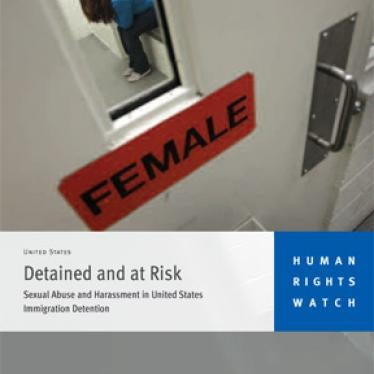(New York) – The US Senate should renew the Violence against Women Act (VAWA) when it votes on the measure later in March 2012, Human Rights Watch said today. The act is the primary federal law providing legal protection and services to counter domestic and sexual violence and stalking. Approval will maintain critical programs and improve legal protection against violence, Human Rights Watch said.
“The Violence against Women Act is more than just another bill,” said Meghan Rhoad, women’s rights researcher at Human Rights Watch. “It is a pledge lawmakers made to women in 1994 that they would stand together against the country’s startlingly high levels of sexual and domestic violence.”
According to December 2011 figures from the Centers for Disease Control and Prevention (CDC), one in four women in the US has been a victim of severe physical violence by an intimate partner in her lifetime, and nearly one in five has been raped. The CDC found that, on average, 24 people every minute are victims of rape, physical violence, or stalking by an intimate partner in the US.
The bipartisan reauthorization bill (S. 1925) was introduced by Senator Patrick Leahy, Democrat of Vermont, and Senator Mike Crapo, Republican of Idaho. The bill has an additional 57 co-sponsors. Congress has reauthorized the VAWA twice since it originally passed in 1994.
The VAWA supports victim services such as rape crisis centers, temporary housing for domestic violence survivors, and programs to address violence against people with disabilities. At a time when states are slashing their budgets, the funding is especially critical for the survival of these programs, Human Rights Watch said.
Ensuring accountability for sexual and domestic violence through the criminal justice system is a cornerstone of the law. The bill provides continued funding for programs to address the nationwide backlog in testing hundreds of thousands of rape kits, which contain forensic evidence collected after sexual violence. National studies have shown that cases in which rape kit evidence was tested were more likely to proceed through the criminal justice system and lead to arrests.
The bill also fills important gaps in the country’s efforts to prevent and respond to violence against immigrant women, Human Rights Watch said. The bill would strengthen the U-visa, a temporary visa allowing an immigrant victim of a serious crime to stay in the US to assist law enforcement in investigating and prosecuting the crime. Only 10,000 U-visas are available each year, but the new bill would allow up to 5,000 unused visas from previous years to be used after the annual cap is reached each year. In addition, stalking would be added to the list of serious crimes covered by the U-visa.
“Too often abusers have held the threat of deportation over immigrant women to keep them from reporting abuse,” Rhoad said. “The U-visa tells women that they can come forward and seek help from law enforcement regardless of their immigration status and that the government won’t allow US immigration law to function as a tool for abusers.”
The bill would also require the Department of Homeland Security to issue regulations to prevent sexual abuse in immigration detention centers. Despite clear congressional intent to cover immigration detention centers under the Prison Rape Elimination Act, proposed regulations currently exempt immigration detention facilities from any responsibilities under the Act.
Nearly 200 allegations of sexual abuse in immigration detention were made between 2007 and mid-2011, according to government documents obtained by the American Civil Liberties Union. The number of reported cases almost certainly does not come close to capturing the extent of the problem, Human Rights Watch said.
Victims of abuse in detention face a range of obstacles and disincentives to reporting, Human Rights Watch said. They include a lack of information about rules governing staff conduct, fear of speaking out against the same authority that is seeking their deportation, and trauma from the abuse in detention and possibly from violence and other abuse they have previously suffered in their countries of origin.
“Great progress has been made under the Violence against Women Act,” Rhoad said. “But much more needs to be done to fulfill the pledge to reduce sexual and domestic violence.”







